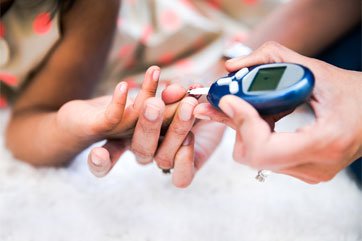What is Prevent T2?
Prevent T2 is a CDC-recognized lifestyle change program designed to help people who are pre-diabetic cut their risk in half for developing type 2 diabetes. This program is also referred to as the National Diabetes Prevention Program (NDPP).
Participant qualifications:
- People who had gestational diabetes
- People with a family history of diabetes and are overweight people with an A1c between 5.7% - 6.4%
- People with a fasting plasma glucose between 100-125 mg/dL
- People who might be at risk according to the CDC Prediabetes Screening Test
The main goals of this program are for the participants to:
- Lose 5-7% of their starting body weight
- Work up to 150 minutes of physical activity per week
- Learn how to eat healthy by tracking daily caloric and fat intake
- Cut their risk for developing type 2 diabetes in half
How is the program set up?
- Participants will attend once per week for four months and then 1-2 times per month over the course of one year
- Sessions last 1 hour
- Sessions are taught by CDC-trained Lifestyle Coaches
Why does this matter?
- Prediabetes is often reversible
- 96 million Americans have prediabetes
- More than 8 out of 10 people with prediabetes don’t know they have it
- If left untreated, many people with prediabetes can develop type 2 diabetes within 5 years
- Complications from type 2 diabetes include: blindness, kidney failure, heart disease, stroke, and amputation of extremities.
Sign up now
For more information or to sign up for the program, please contact Jenny Young at Jenny.Young@OwensboroHealth.org.
